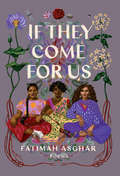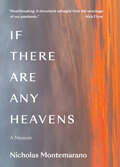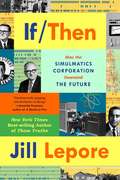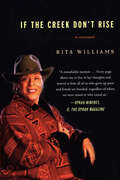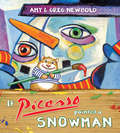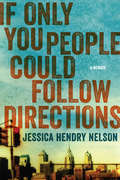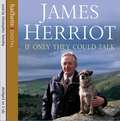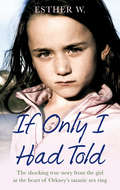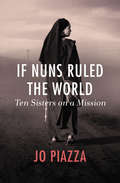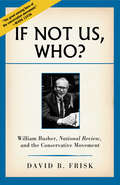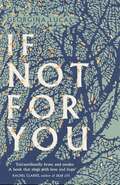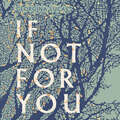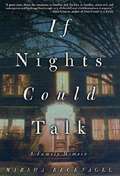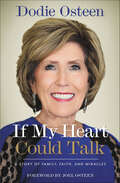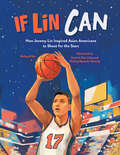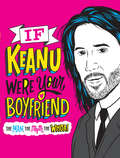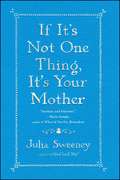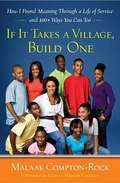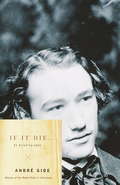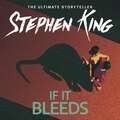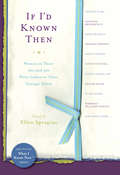- Table View
- List View
If They Come for Us: Poems
by Fatimah AsgharPoet and co-creator of the Emmy-nominated web series Brown Girls captures her experience as a Pakistani Muslim woman in contemporary America, while exploring identity, violence, and healing. <p><p> An aunt teaches me how to tellan edible flowerfrom a poisonous one. Just in case, I hear her say, just in case. <p><p> Orphaned as a child, Fatimah Asghar grapples with coming of age and navigating questions of sexuality and race without the guidance of a mother or father. These poems at once bear anguish, joy, vulnerability, and compassion, while also exploring the many facets of violence: how it persists within us, how it is inherited across generations, and how it manifests itself in our relationships. In experimental forms and language both lyrical and raw, Asghar seamlessly braids together marginalized people’s histories with her own understanding of identity, place, and belonging.
If There Are Any Heavens: A Memoir
by Nicholas MontemaranoWritten with visceral urgency in the earliest days of grief, If There Are Any Heavens resists categorization: it is a memoir, a poem, a mournful but loving song. On January 6, 2021, at the peak of the COVID-19 pandemic in America, while the U.S. Capitol is under attack, Nicholas Montemarano drives six hundred miles to see his mother, who is hospitalized with COVID pneumonia and in a critical state. For ten days he lives in a hotel minutes from the hospital, alternating between hope and helplessness. This is the story of those ten days. It is the story of the pandemic told through the intimate prism of one family’s loss. Written with visceral urgency in the earliest days of grief, If There Are Any Heavens resists categorization: it is a memoir, a poem, a mournful but loving song. Its form asks readers to slow down and breathe between each broken line. At other moments, a chorus of voices—anti-maskers, COVID-deniers, and doctors—causes the reader to become breathless. It is an almost real-time account of the anxiety, uncertainty, and sorrow brought on by this pandemic. It is also, finally, a devastating homage to a family’s love in a time of great loss. Now, and many years from now, when people want to understand the personal cost of the COVID-19 pandemic, they will turn to this intimate and spare elegy from a son to his mother.
If Then: How Simulmatics Corporation Invented The Future
by Jill LeporeLonglisted • Financial Times & McKinsey Business Book of the Year A revelatory account of the Cold War origins of the data-mad, algorithmic twenty-first century, from the author of the acclaimed international bestseller These Truths. The Simulmatics Corporation, launched during the Cold War, mined data, targeted voters, manipulated consumers, destabilized politics, and disordered knowledge—decades before Facebook, Google, and Cambridge Analytica. Jill Lepore, best-selling author of These Truths, came across the company’s papers in MIT’s archives and set out to tell this forgotten history, the long-lost backstory to the methods, and the arrogance, of Silicon Valley. Founded in 1959 by some of the nation’s leading social scientists—“the best and the brightest, fatally brilliant, Icaruses with wings of feathers and wax, flying to the sun”—Simulmatics proposed to predict and manipulate the future by way of the computer simulation of human behavior. In summers, with their wives and children in tow, the company’s scientists met on the beach in Long Island under a geodesic, honeycombed dome, where they built a “People Machine” that aimed to model everything from buying a dishwasher to counterinsurgency to casting a vote. Deploying their “People Machine” from New York, Washington, Cambridge, and even Saigon, Simulmatics’ clients included the John F. Kennedy presidential campaign, the New York Times, the Department of Defense, and dozens of major manufacturers: Simulmatics had a hand in everything from political races to the Vietnam War to the Johnson administration’s ill-fated attempt to predict race riots. The company’s collapse was almost as rapid as its ascent, a collapse that involved failed marriages, a suspicious death, and bankruptcy. Exposed for false claims, and even accused of war crimes, it closed its doors in 1970 and all but vanished. Until Lepore came across the records of its remains. The scientists of Simulmatics believed they had invented “the A-bomb of the social sciences.” They did not predict that it would take decades to detonate, like a long-buried grenade. But, in the early years of the twenty-first century, that bomb did detonate, creating a world in which corporations collect data and model behavior and target messages about the most ordinary of decisions, leaving people all over the world, long before the global pandemic, crushed by feelings of helplessness. This history has a past; If Then is its cautionary tale.
If The Creek Don't Rise: A Memoir
by Rita WilliamsWhen Rita Williams was four, her mother died in a Denver boarding house. This death delivered Rita into the care of her aunt Daisy, the last surviving African American widow of a Union soldier and a maverick who had spirited her sharecropping family out of the lynching South and reinvented them as ranch hands and hunting guides out West. But one by one they slipped away, to death or to an easier existence elsewhere, leaving Rita as Daisy's last hope to right the racial wrongs of the past and to make good on a lifetime of thwarted ambition. If the Creek Don't Rise tells how Rita found her way out from under this crippling legacy and, instead of becoming "a perfect credit to her race," discovered how to become herself. Set amid the harsh splendor of the Colorado Rockies, this is a gorgeous, ruthless, and unique account of the lies families live-and the moments of truth and beauty that save us.
If Picasso Painted a Snowman
by Amy Newbold Greg NewboldMaryland Blue Crab Honor Book 2018 A big, brightly colored, playful introduction to various important painters and art movements. If someone asked you to paint a snowman, you would probably start with three white circles stacked one upon another. Then you would add black dots for eyes, an orange triangle for a nose, and a black dotted smile. But if Picasso painted a snowman… From that simple premise flows this delightful, whimsical, educational picture book that shows how the artist’s imagination can summon magic from a prosaic subject. Greg Newbold’s chameleon-like artistry shows us Roy Lichtenstein’s snow hero saving the day, Georgia O’Keefe’s snowman blooming in the desert, Claude Monet’s snowmen among haystacks, Grant Wood’s American Gothic snowman, Jackson Pollock’s snowman in ten thousand splats, Salvador Dali’s snowmen dripping like melty cheese, and snowmen as they might have been rendered by J. M. W. Turner, Gustav Klimt, Paul Klee, Marc Chagall, Georges Seurat, Pablita Velarde, Piet Mondrian, Sonia Delaunay, Jacob Lawrence, and Vincent van Gogh. Our guide for this tour is a lively hamster who—also chameleon-like—sports a Dali mustache on one spread, a Van Gogh ear bandage on the next. “What would your snowman look like?” the book asks, and then offers a page with a picture frame for a child to fill in. Backmatter thumbnail biographies of the artists complete this highly original tour of the creative imagination that will delight adults as well as children. Fountas & Pinnell Level O
If Only You People Could Follow Directions: A Memoir
by Jessica Hendry NelsonIf Only You People Could Follow Directions is a spellbinding debut by Jessica Hendry Nelson. In linked autobiographical essays, Nelson has reimagined the memoir with her thoroughly original voice, fearless writing, and hypnotic storytelling. At its center, the book is the story of three people: Nelson's mother Susan, her brother Eric, and Jessica herself. These three characters are deeply bound to one another, not just by the usual ties of blood and family, but also by a mother's drive to keep her children safe in the midst of chaos. The book begins with Nelson's childhood in the suburbs of Philadelphia and chronicles her father's addiction and death, her brother's battle with drugs and mental illness, her own efforts to find and maintain stability, and her mother's exquisite power, grief, and self-destruction in the face of such a complicated family dynamic. Each chapter in the book contends with a different relationship-friends, lovers, and strangers are all play-but at its heart the book is about family, the ties that bind and enrich and betray us, and how one young woman sought to survive and rise above her surroundings.
If Only They Could Talk
by James HerriotWhen the newly qualified vet, James Herriot, arrives in the small Yorkshire village of Darrowby, he has no idea of the new friends he will meet or adventures that lie ahead. From the author whose books inspired the BBC series All Creatures Great and Small, this first volume of unforgettable memoirs chronicles James Herriot's first years as a country vet, with the signature storytelling magic that has made him a favourite the world over. Here is a book for all those who find laughter and joy in animals, and who know and understand the magic of wild places and beautiful countryside
If Only I Had Told
by Esther W.‘The satanic sex ring takes place around a quarry, near your friend’s house. As well as your family there are four others, so far that we know of, involved.’When her dad was arrested and imprisoned for violently abusing his 15 children, Esther thought her life could begin at last. She couldn't have been more wrong. Another man was ready to take advantage of this vulnerable girl. Social services stepped in again, but this time they made things much, much worse . . .If Only I Had Told is Esther’s personal and very brave memoir that tells the truth about Orkney’s 1991 satanic sex scandal. It is a shocking account of how two evil men and a flawed system let down not just a young girl but a whole community.
If Nuns Ruled the World: Ten Sisters on a Mission
by Jo Piazza&“Fascinating profiles&” of remarkable nuns, from an eighty-three-year-old Ironman champion to a crusader against human trafficking (Daily News [New York]). &“In an age of villainy, war and inequality, it makes sense that we need superheroes,&” writes Nicholas Kristof of The New York Times. &“And after trying Superman, Batman and Spider-Man, we may have found the best superheroes yet: Nuns.&” In If Nuns Ruled the World, veteran reporter Jo Piazza overthrows the popular perception of nuns as killjoy schoolmarms, instead revealing them as the most vigorous catalysts of change in an otherwise repressive society. Meet Sister Simone Campbell, who traversed the United States challenging a Congressional budget that threatened to severely undermine the well-being of poor Americans; Sister Megan Rice, who is willing to spend the rest of her life in prison if it helps eliminate nuclear weapons; and the inimitable Sister Jeannine Gramick, who is fighting for acceptance of gays and lesbians in the Catholic Church. During a time when American nuns are often under attack from the very institution to which they devote their lives—and the values of the institution itself are hotly debated—these sisters offer thought-provoking and inspiring stories. As the Daily Beast put it, &“Anybody looking to argue there is a place for Catholicism in the modern world should just stand on a street corner handing out Piazza&’s book.&”
If Not Us, Who?: William Rusher, National Review, and the Conservative Movement
by David B. FriskIf Not Us, Who? is both the story of an architect of the modern conservative movement and a colorful journey through a half century of high-level politics. Best known as the longtime publisher of National Review, William Rusher (1923–2011) was more than just a crucial figure in the history of the Right&’s leading magazine. He was a political intellectual, tactician, and strategist who helped shape the historic rise of conservatism. To write If Not Us, Who?, David B. Frisk pored over Rusher&’s voluminous papers at the Library of Congress and interviewed dozens of insiders, including National Review founder William F. Buckley Jr., in addition to Rusher himself. The result is a gripping biography that shines new light on Rusher&’s significance as an observer and an activiast while bringing to life more than a generation&’s worth of political hopes, fears, and controversies. Frisk vividly captures the joys and struggles at National Review, including Rusher&’s complex relationship with the legendary Buckley. Here we see the powerful blend of wit, erudition, dedication, shrewdness, and earnestness that made Rusher an influential figure at NR and an indispensable link between conservatism&’s leading theorists and its political practitioners. &“If not us, who? If not now, when?&”—a maxim often attributed to Ronald Reagan—could have been Rusher&’s motto. In everything he did—publishing National Review, recruiting and advising political candidates, organizing cadres of young conservatives, taking on liberal advocates in a popular television debate program, writing a syndicated column—his objective was to build a movement. His tireless efforts proved essential to conservatism&’s ascendancy, from the pivotal Goldwater campaign through the Reagan era. Largely unexamined until now, Rusher&’s career opens a new window onto the history of the conservative movement. This comprehensive biography reintroduces readers to a remarkable man of thought and action.
If Not Now, When?
by Esther RantzenTV personality, founder of Childline, writer and broadcaster, Esther Rantzen has spent her life tirelessly campaigning on behalf of children and mental health sufferers. In this personal and anecdotal handbook, she turns her attention to the baby boomer and shows how, ultimately, reaching your fifties and beyond is just the beginning. Starting from her own experiences whether it be her childhood, the death of her husband, her battle with prejudice against women in the media, laughter and the love of friends, irritations with brainless ageism, the importance of travel, sex and good health all is of huge relevance and will give the fifty-something-plus-year-old a huge jolt of recognition, or a shocked gasp, or a laugh. Interspersed with practical advice and the occasional nostalgic rant, this is a fun celebration and an inspiration for the nations 17 million baby boomers.
If Not Now, When?
by Esther RantzenTV personality, founder of Childline, writer and broadcaster, Esther Rantzen has spent her life tirelessly campaigning on behalf of children and mental health sufferers. In this personal and anecdotal handbook, she turns her attention to the baby boomer and shows how, ultimately, reaching your fifties and beyond is just the beginning. Starting from her own experiences whether it be her childhood, the death of her husband, her battle with prejudice against women in the media, laughter and the love of friends, irritations with brainless ageism, the importance of travel, sex and good health all is of huge relevance and will give the fifty-something-plus-year-old a huge jolt of recognition, or a shocked gasp, or a laugh. Interspersed with practical advice and the occasional nostalgic rant, this is a fun celebration and an inspiration for the nations 17 million baby boomers.
If Not For You: A Memoir (Georgina Lucas)
by Georgina Lucas'If I were to look closely at the jagged edges of my fragmented heart, I'm sure I'd see that some spaces now shine with gold. And that is what he left for me.'_______________________'An extraordinarily brave, honest and tender book' RACHEL CLARKE'Full of strength and hope' KATE MOSSE'The most beautiful thing I have ever read' TOM BRADBY'Extraordinary' ANITA RANI, WOMAN'S HOUROn the 17th November 2019, Grey Atticus Fox was born, nine weeks early, to Georgie and Mike in a Kent hospital.Heart wrenching, cathartic, life-affirming, this is her account of the 21 days they had together, and its aftermath - the search to make sense of unimaginable loss. It bears witness to both the confusion and the clarity that accompany great pain, and stands as a testament to empathy, care and humanity when life is at its hardest.'He was looked after by strangers who became family, and he saw more kindness, more love, in twenty-one days than some might see in a lifetime. For his brief moments in this world, he experienced all of the very best things it can offer.'Georgie's spare, intimate and at times surprisingly comic writing offers an extraordinary message of hope. If Not For You is about the redeeming power of love, even in our darkest hour.'I cannot stop thinking about it' LUCY FOLEY'An unflinching and beautiful book' SOPHIE KINSELLA'Georgie Lucas writes superbly' MIRIAM STOPPARD
If Not For You: A Memoir (Georgina Lucas)
by Georgina Lucas'If I were to look closely at the jagged edges of my fragmented heart, I'm sure I'd see that some spaces now shine with gold. And that is what he left for me.'_______________________'An extraordinarily brave, honest and tender book' RACHEL CLARKE'Full of strength and hope' KATE MOSSE'The most beautiful thing I have ever read' TOM BRADBY'Extraordinary' ANITA RANI, WOMAN'S HOUROn the 17th November 2019, Grey Atticus Fox was born, nine weeks early, to Georgie and Mike in a Kent hospital.Heart wrenching, cathartic, life-affirming, this is her account of the 21 days they had together, and its aftermath - the search to make sense of unimaginable loss. It bears witness to both the confusion and the clarity that accompany great pain, and stands as a testament to empathy, care and humanity when life is at its hardest.'He was looked after by strangers who became family, and he saw more kindness, more love, in twenty-one days than some might see in a lifetime. For his brief moments in this world, he experienced all of the very best things it can offer.'Georgie's spare, intimate and at times surprisingly comic writing offers an extraordinary message of hope. If Not For You is about the redeeming power of love, even in our darkest hour.'Hypnotic' MAIL ON SUNDAY''Profoundly moving' TIMES2'A testimony to empathy, care and humanity when life is at its hardest' STYLIST'I cannot stop thinking about it' LUCY FOLEY'An unflinching and beautiful book' SOPHIE KINSELLA'Georgie Lucas writes superbly' MIRIAM STOPPARD
If Nights Could Talk: A Family Memoir
by Marsha RecknagelIf Nights Could Talk is a rich gothic story of a Southern family, a tale of wealth and emotional need that spans generations. Marsha Recknagel's memoir begins with the surprise appearance of her 16-year-old nephew, Jamie, who arrives on her doorstep and into her ordered, childless life. Fleeing a chaotic home run by Marsha's unstable younger brother and his wife, Jamie is an ominous creature-and the center of an ongoing family tug-of-war. For Marsha, to open the door is to risk opening herself up to the pain of the past. Reluctantly she takes him in. Thus begins the painful, terrifying, and extraordinary process of unraveling the damage inflicted by her family on one of its own.
If My Heart Could Talk: A Story of Family, Faith, and Miracles
by Dodie OsteenDodie Osteen, mother of Joel Osteen, gives readers a personal account of her extraordinary life and shares what she has learned about love, faith, and family.As the wife of forty-four years to the late Pastor John Osteen, founder of Lakewood Church, Dodie Osteen stood as a wife, mother, and first lady of the church, even when life felt anything but steady. Today, she continues to stand by her son, Pastor Joel Osteen, and the rest of their family as they lead Lakewood. In this revealing memoir, Dodie shares that her path, though glorious, has not always been easy. She shows an intimate look at such life-altering experiences as contracting polio as a child, raising 5 children, battling cancer, and losing her husband, all with the beautiful heart and sense of humor she displays to thousands at Lakewood and nationwide at Night of Hope events. While recounting her journey, Dodie offers readers meaningful life lessons applicable to their own lives.
If Loving You Is Wrong: The Shocking True Story of Mary Kay Letourneau
by Gregg OlsenThe true story of the elementary schoolteacher and mother of four who just couldn't keep her hands off a 13-year-old boy. Worse yet, Mary Kay Letourneau had become obsessed with the slight, Samoan teenager while he was still a student in her sixth-grade class--and he fathered two babies with her. Yet in the hands of true crime writer Gregg Olsen, If Loving You Is Wrong becomes a poignant profile of an emotionally stunted young woman tightly wound up in a web of lies too fragile to sustain the weight of her own compulsions.
If Lin Can: How Jeremy Lin Inspired Asian Americans to Shoot for the Stars
by Richard HoThis biography of basketball superstar Jeremy Lin is an anthem of Asian American pride that speaks to any child who feels underestimated or misunderstood. If Lin can, you can!Have you ever been told that you CAN&’T? Growing up in the Bay Area, Jeremy Lin heard that over and over again. People made fun of his size and his race and wouldn&’t give him a chance. But Jeremy persevered until he became the first Taiwanese American to play in the NBA. And when his big moment came, he seized it!Jeremy&’s meteoric rise, dubbed "Linsanity," inspired the world and a whole generation of young Asian Americans. As author Richard Ho puts it, &“Jeremy&’s struggles were our struggles, so his triumphs were our triumphs. He made us believe that if he could succeed, so could we.&”
If Keanu Were Your Boyfriend: The Man, the Myth, the WHOA!
by Marisa PolanskyImagine dating the internet's boyfriend in this illustrated homage to the always charming and often enigmatic Keanu Reeves. This full-color hardcover contains biographical information as well as illustrated quotes straight from the unicorn-of-a-man himself.Keanu Reeves insists he's "just a normal guy" despite being one of the most recognizable (and most excellent) faces in Hollywood. Apparently, Keanu's humility knows no bounds--just like our love for him. After all, the Keanusance didn't just come out of nowhere. He's had an epic four-decade-long acting career that includes the heart-stopping John Wick, the heart-melting Always Be My Maybe, and the heart-pounding The Matrix. His generosity and kindness are legendary, and he remains an enigmatic mystery we're dying to solve. And how could we forget, he's the Sexiest Man Alive!Part biography and part dreamlike narrative, this vibrant book imagines what it would be like if the internet's boyfriend were YOUR boyfriend. Get to know your man even better through stunning hand-lettered quotes including gems like: "I don't get out much" and "Life is good when you have a good sandwich." If Keanu Were Your Boyfriend is the perfect celebration of the man, the myth, the whoa: Keanu Reeves.
If It's Not One Thing, It's Your Mother
by Julia Sweeney“I took so long to assemble my lovely family. If only they would disappear.” While Julia Sweeney is known as a talented comedienne and writer and performer of her one-woman shows, she is also a talented essayist. Happily for us, the past few years have provided her with some rich material. Julia adopted a Chinese girl named Mulan (“After the movie?”) and then, a few years later, married and moved from Los Angeles to Chicago. She writes about deciding to adopt her child, strollers, nannies (including the Chinese Pat), knitting, being adopted by a dog, The Food Network, and meeting Mr. Right through an email from a complete stranger who wrote, “Desperately Seeking Sweeney-in-Law.” She recounts how she explained the facts of life to nine-year-old Mulan, a story that became a wildly popular TED talk and YouTube video. Some of the essays reveal Julia’s ability to find that essential thread of human connection, whether it’s with her mother-in-law, who candidly reveals a story that most people would keep a secret, or with an anonymous customer service rep during a late-night phone call. But no matter what the topic, Julia always writes with elegant precision, pinning her jokes with razor-sharp observations while articulating feelings that we all share. Poignant, provocative, and wise, this is a funny, and at times powerful, memoir by a woman living her life with originality and intelligence.
If It Takes a Village, Build One: How I Found Meaning Through a Life of Service and 100+ Ways You Can Too
by Malaak Compton-RockA must have book for anyone has ever wanted to make a difference in the world. ________________________________________________ Service is the rent we pay for living" says preeminent children's advocate Marian Wright Edelman and this is the motto by which Malaak Compton Rock, dedicated humanitarian and wife of comedian Chris Rock, lives her life. From a childhood grounded in the importance of giving back to her work in public relations at The U. S. Fund for UNICEF to becoming a full-time mother and humanitarian, Malaak's life has fully embodied this sentiment. Part memoir, part practical guide,If It Takes a Village, Build Oneoffers readers insightful advice on everything from how to find just the right volunteer opportunity, how to get kids involved in a life of service, how to research charities, and even how to start a nonprofit, as Malaak did several years ago. All of this practical wisdom is grounded in inspirational anecdotes about her own experience with service, including her work with Katrina rebuilding and her recent brainchild, Journey for Change: Empowering Youth Through Global Service, a program for at-risk kids from Bushwick, Brooklyn, which takes teens on a two week service mission to South Africa to volunteer and experience the world. The book also features interviews with other well known humanitarians, like PR powerhouse Terrie M. Williams, activist Bobby Shriver, and journalist Soledad O'Brien and engaging sidebars with interesting facts about service and nuggets of advice. At the end of the narrative readers will find a compendium of information including Malaak's favorite charities, unique service ideas, and suggested reading and web resources, which will make this a book to be visited time and time again. Far from being preachy or sanctimonious, Malaak's warm voice reminds us all that giving back is ultimately easier and infinitely more fulfilling than we thought it could be. Warm, honest, and accessible,If it Takes a Village, Build Onewill be the must-have book (and perfect gift!) for aspiring do-gooders.
If It Die
by Andre GideThis is the major autobiographical statement from Nobel laureate André Gide. In the events and musings recorded here we find the seeds of those themes that obsessed him throughout his career and imbued his classic novels The Immoralist and The Counterfeiters. Gide led a life of uncompromising self-scrutiny, and his literary works resembled moments of that life. With If It Die, Gide determined to relay without sentiment or embellishment the circumstances of his childhood and the birth of his philosophic wanderings, and in doing so to bring it all to light. Gide's unapologetic account of his awakening homosexual desire and his portrait of Oscar Wilde and Lord Alfred Douglas as they indulged in debauchery in North Africa are thrilling in their frankness and alone make If It Die an essential companion to the work of a twentieth-century literary master.
If It Bleeds: a stand-alone sequel to the No. 1 bestseller The Outsider, plus three irresistible novellas
by Stephen KingThe No.1 Sunday Times bestseller featuring a stand-alone sequel to The Outsider as well as the novella 'Mr Harrigan's Phone', soon to be a Netflix original film.News people have a saying: 'If it bleeds, it leads'. And a bomb at Albert Macready Middle School is guaranteed to lead any bulletin.Holly Gibney of the Finders Keepers detective agency is working on the case of a missing dog - and on her own need to be more assertive - when she sees the footage on TV. But when she tunes in again, to the late-night report, she realises there is something not quite right about the correspondent who was first on the scene. So begins 'If It Bleeds', a stand-alone sequel to the No. 1 bestselling THE OUTSIDER featuring the incomparable Holly on her first solo case - and also the riveting title story in Stephen King's brilliant new collection.Dancing alongside are three more wonderful long stories from this 'formidably versatile author' (The Sunday Times) - 'Mr Harrigan's Phone', 'The Life of Chuck' and 'Rat'. All four display the richness of King's storytelling with grace, humour, horror and breathtaking suspense. A fascinating Author's Note gives us a wonderful insight into the origin of each story and the writer's unparalleled imagination.(P)2020 Simon & Schuster Audio
If I'd Known Then: Women in Their 20s and 30s Write Letters to Their Younger Selves
by Ellyn SpraginsNow in paperback, the popular second volume in the What I Know Now™ series offers wonderfully candid letters from women under forty, who give advice to the girls they once were. Readers will discover familiar names as well as new voices, including actress Jessica Alba; singer/songwriter Natasha Bedingfield; author Hope Edelman; Olympic soccer gold medalist Julie Foudy; singer/songwriter Lisa Loeb; and actress Kimberly Williams-Paisley. Here are stories of young love; of daring to chart a new path when everyone tells you to play it safe; of realizing that perfection is a pipe dream. The ideal gift for any young woman in your life, this collection provides "a boost of hope that today’s turmoil can foster tomorrow’s growth, success, and happiness” (Boston Globe).
